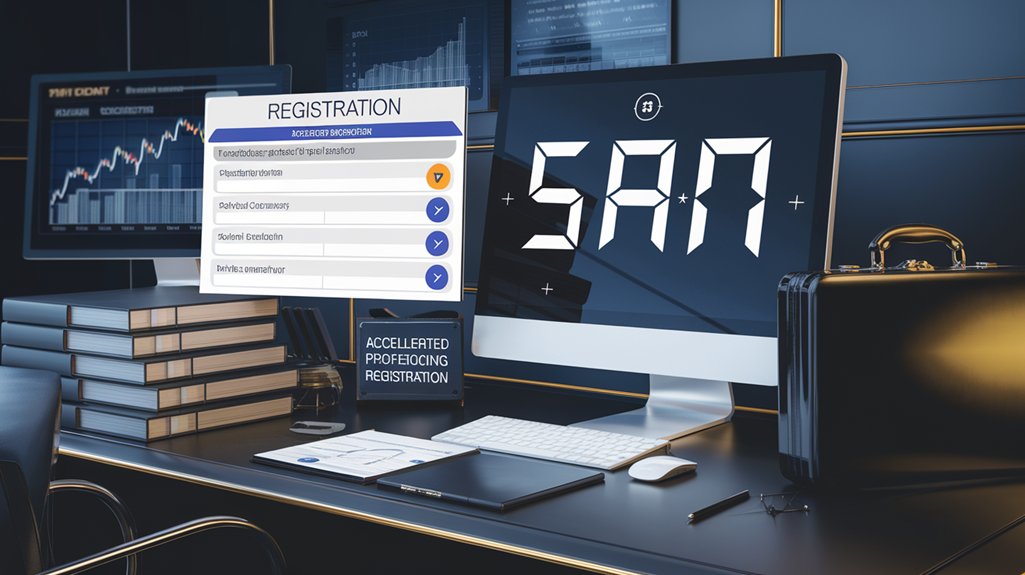Legitimate SAM registration expediting options include hiring professional consulting firms, assigning dedicated team members, and completing entity validation steps in advance. Companies should prepare thorough documentation packages, submit during low-volume periods (January-March), and avoid peak times (July-September). Strategic timing during GSA business hours speeds processing, while proactive error correction minimizes delays. Regular monitoring and maintaining updated contact information guarantee compliance. These strategies can reduce the typical 10-20 hour registration process considerably and prevent costly registration lapses.
Legitimate Strategies to Fast-Track Your SAM Registration

Steering the System for Active Merchant (SAM) registration process requires careful preparation and strategic planning to avoid unnecessary delays. Organizations seeking legitimate shortcuts can notably reduce processing time by maintaining thorough, up-to-date documentation packages ready for immediate submission.
Effective registration tips include assigning a dedicated team member to manage the process, ensuring all entity validation steps are completed in advance, and responding promptly to any GSA inquiries. Professional assistance from firms like GSE can help businesses achieve error-free registrations that enhance competitiveness in the federal marketplace. Third-party experts provide specialized guidance to navigate complex renewal requirements and minimize processing delays.
Companies should also:
- Submit applications during GSA’s business hours for immediate processing
- Prepare notarized letters of intent before starting the online submission
- Review SAM.gov’s interface and requirements thoroughly
- Set up tracking alerts to monitor application status
Following these established protocols creates a clear path through bureaucratic requirements while maintaining full compliance with government standards.
Professional Services and Expert Assistance Options

While self-guidance of the SAM registration process works for many organizations, professional assistance can greatly reduce both time and stress involved.
Third-party consulting firms like US Federal Contractor Registration (USFCR), FAMR, and Kaizen Management Group offer specialized expertise in traversing complex federal requirements.
The registration expertise these services provide includes document preparation, data verification, and strategic positioning for federal contracting opportunities.
Businesses can benefit from thorough end-to-end support, from initial application through renewals. Without professional help, many organizations find the complex process overwhelming, as it involves strict requirements and detailed documentation.
Consulting benefits extend beyond just completing forms—professional services guarantee compliance with regulations, verify data consistency across federal databases, and provide ongoing support for issues that arise.
These experts can markedly reduce submission time while improving accuracy, ultimately helping businesses maintain eligibility for government contracts without interruption.
Professional services typically save businesses the 10-20 hours needed to complete SAM registration independently.
Regular monitoring through SAM maintenance services helps businesses avoid costly penalties and maintain compliance with government regulations.
Proactive Steps to Minimize SAM Processing Delays

Implementing proactive measures considerably reduces SAM registration delays and streamlines the approval process. Organizations should meticulously verify all business information before submission, ensuring registration accuracy in every field from entity details to points of contact. Completion typically requires 24 hours for activation after all required information is submitted correctly.
Strategic submission timing considerably impacts processing speed. Applicants should avoid peak registration periods, typically at federal fiscal year-end (July-September), when system congestion causes longer wait times. Instead, submit during January-March when processing volumes are lower. Obtaining a DUNS number is a mandatory first step before beginning the registration process.
Pre-submission preparation includes:
- Gathering all required documentation beforehand
- Using the SAM Status Tracker to monitor progress
- Setting calendar reminders for annual renewals
Organizations should also maintain updated contact information to receive time-sensitive communications from SAM administrators. Addressing any identified errors promptly prevents extended delays in achieving active registration status. Having a properly assigned Unique Entity Identifier is necessary before submitting proposals or applying for government grants.
Frequently Asked Questions
Can I Register Multiple Businesses Under One SAM Account?
Multiple businesses cannot be registered under a single SAM account. Effective SAM account management requires each business to have its separate registration with unique Entity IDs, EIN numbers, and banking information.
Business registration strategies should focus on creating individual accounts for each legal entity. Each company must designate its own E-Business Point of Contact and provide distinct physical addresses.
While one owner may register multiple businesses, each requires its own complete SAM profile for government contracting eligibility.
Will My SAM Registration Affect My Credit Score?
SAM registration does not affect a business or individual’s credit score.
Credit score factors are determined by financial behaviors such as payment history and debt utilization, not government registration processes.
The SAM system primarily verifies business information and eligibility for federal contracts.
While SAM may collect financial information for verification purposes, this data collection doesn’t influence credit reporting agencies or credit scoring algorithms.
How Do Emergency Government Contracts Bypass Standard SAM Timeframes?
Emergency contracts can legally bypass standard SAM timeframes through several mechanisms.
During disasters, agencies may allow contractors to register after award but before invoice submission, rather than before bidding.
Procurement processes can be expedited under FAR Part 18 emergency provisions, with contracting officers documenting the urgency.
The Disaster Response Registry in SAM helps identify qualified suppliers quickly.
While full SAM registration remains required, these provisions enable faster emergency response while maintaining legal compliance.
Can Foreign-Owned Companies Expedite SAM Registration Differently?
Foreign-owned companies face the same SAM registration timeframes as domestic entities.
No special expedited registration process exists specifically for foreign businesses. These companies must still meet all foreign eligibility requirements, including obtaining DUNS numbers and NCAGE codes before registration.
The most effective approach is ensuring complete, accurate documentation from the start. While the standard 7-10 business day processing applies universally, thorough preparation of all required international documentation remains the best strategy for avoiding unnecessary delays.
Are There Seasonal Fluctuations in SAM Processing Speeds?
SAM registration processing speeds do experience seasonal trends throughout the year.
Processing delays typically occur during peak periods, such as near the end of the government fiscal year (September 30), when contractors rush to register before new budget cycles begin.
Additionally, federal holidays and system maintenance periods can temporarily slow processing times.
Registration volume increases of up to 42% year-over-year suggest that planning for these predictable fluctuations is advisable for businesses seeking timely registration completion.